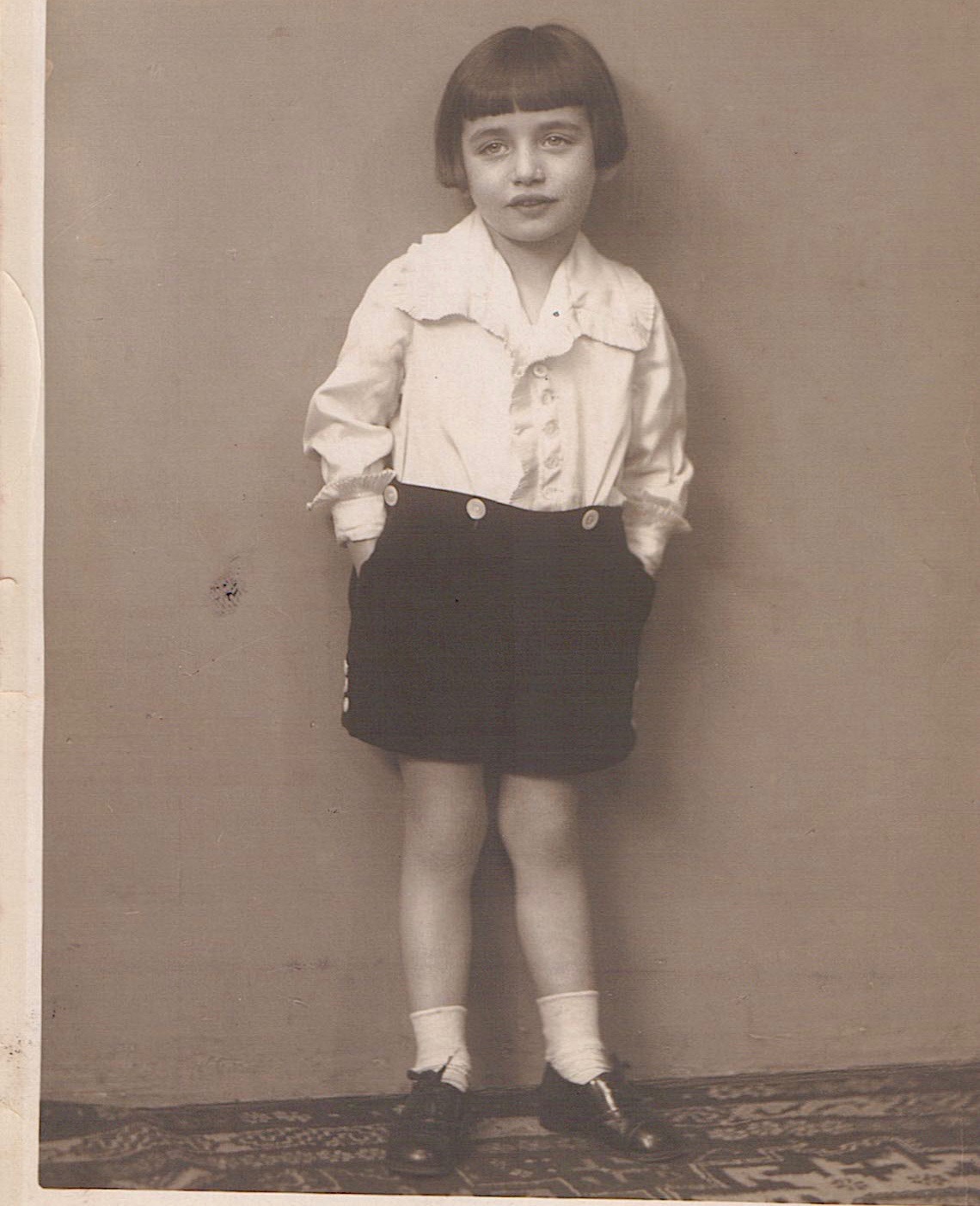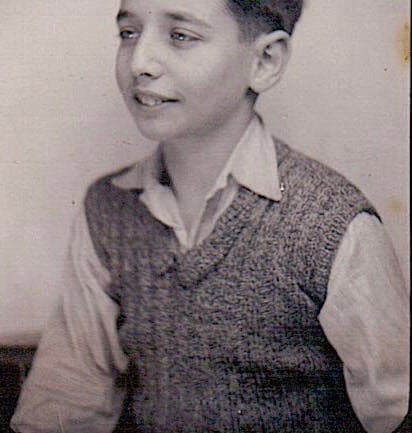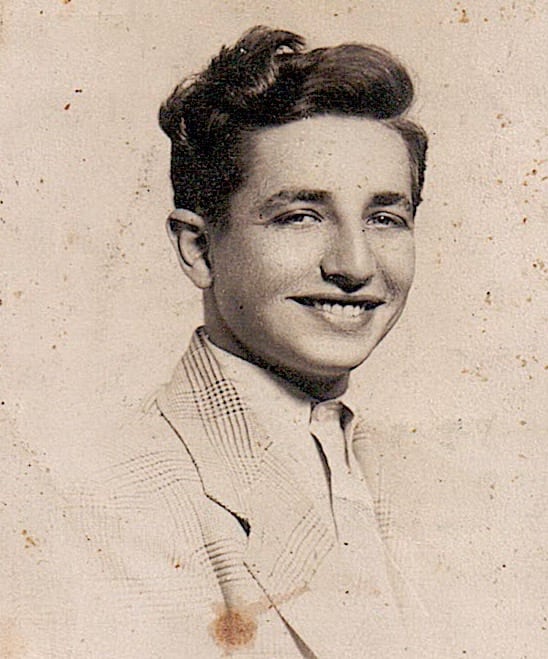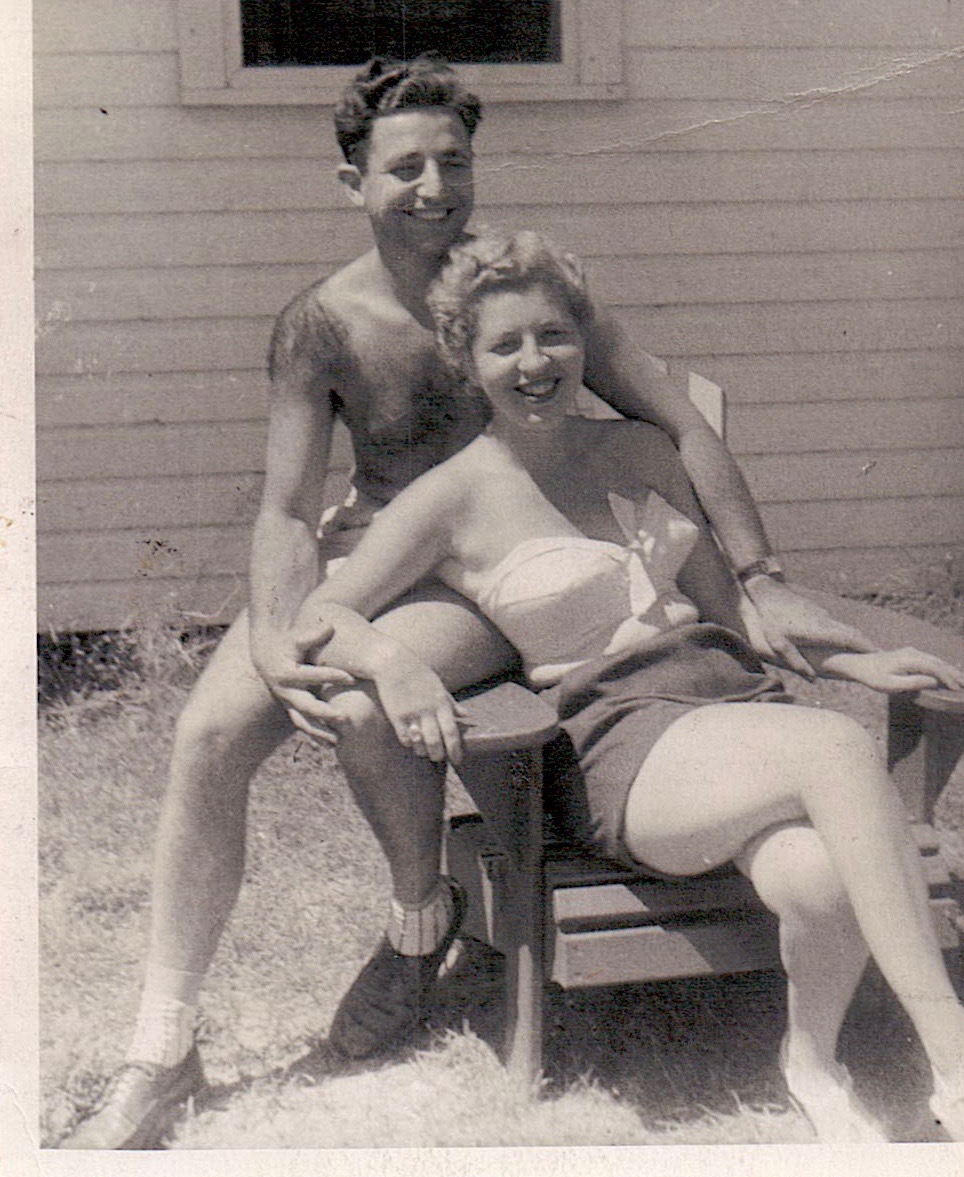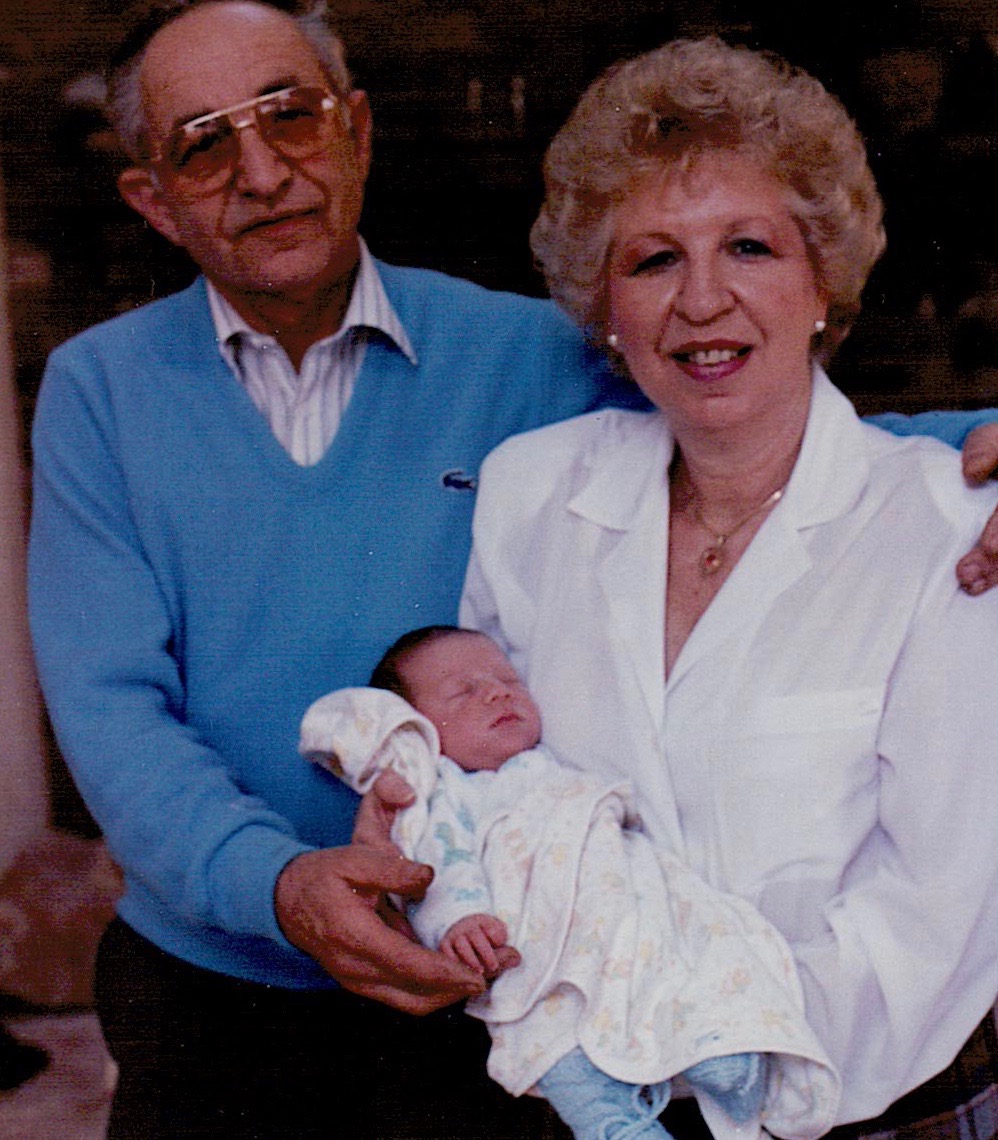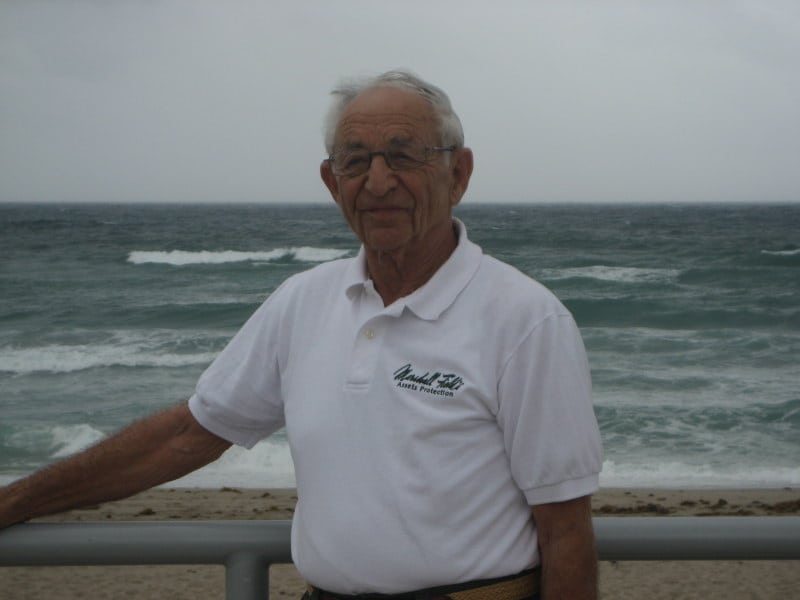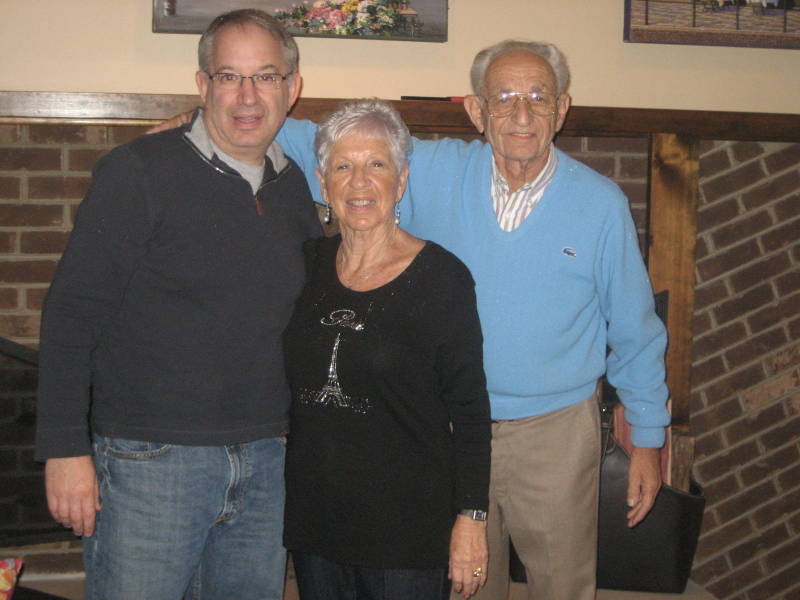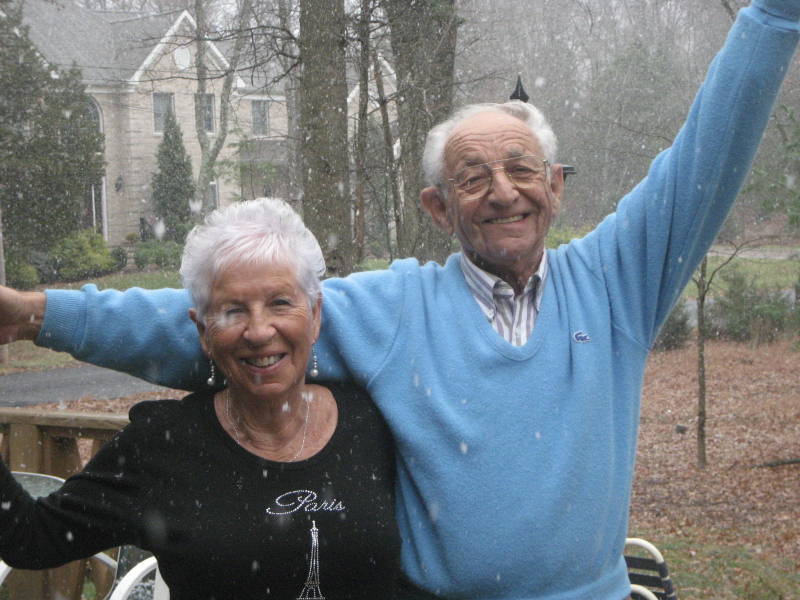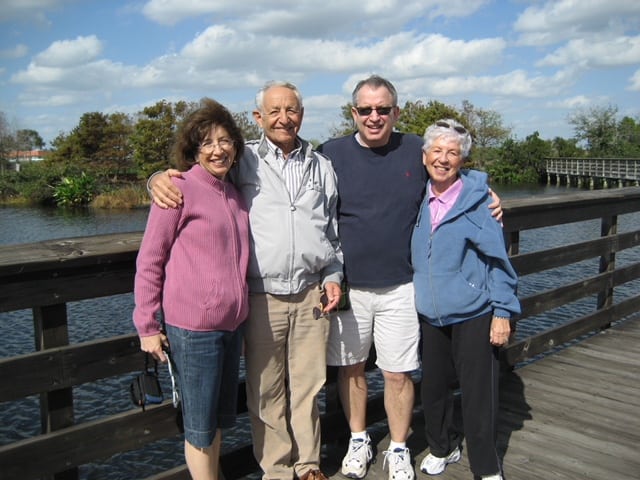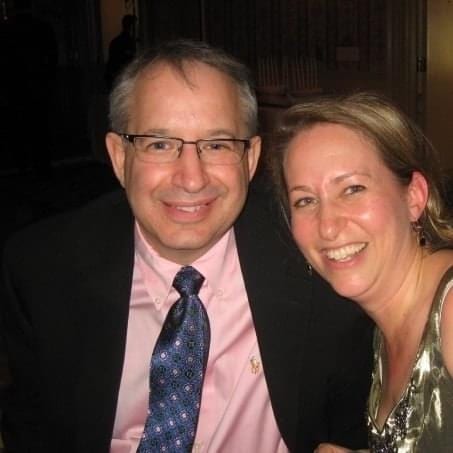- Local Survivor registry
- HANS WERNER JOACHIMSTHAL
- Local Survivor registry
- HANS WERNER JOACHIMSTHAL
Survivor Profile
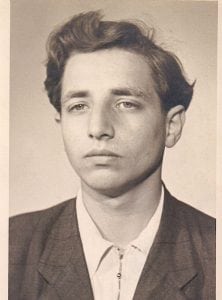
HANS
WERNER
JOACHIMSTHAL
(1927-2010)
PRE-WAR NAME:
HANS WERNER JOACHIMSTHAL
HANS WERNER JOACHIMSTHAL
PLACE OF BIRTH:
BERLIN, GERMANY
BERLIN, GERMANY
DATE OF BIRTH:
FEBRUARY 28, 1927
FEBRUARY 28, 1927
LOCATION(s) BEFORE THE WAR:
BERLIN, GERMANY
BERLIN, GERMANY
LOCATION(s) DURING THE WAR:
AUSCHWITZ
AUSCHWITZ
STATUS:
CHILD SURVIVOR
CHILD SURVIVOR
RELATED PERSON(S):
CHARLOTTE JOACHIMSTHAL - Spouse (Deceased),
DAVID JOACHIM - Son,
GISELE JOACHIM - Daughter-in-law,
JORDAN JOACHIM - Grandson,
ALEXA JOACHIM - Granddaughter
-
BIOGRAPHY BY DAVID JOACHIM, SON
EULOGY SUBMITTED BY DAVID JOACHIM, SON
I would like to thank all our friends and family today to share this memorial for my father Werner Joachimsthal. As you all know my dad passed away on December 5 at 2:05 AM in New Jersey. His death was very quick and was a shock to all of us. He will be missed.
My dad was a very special individual. Everyone who knows him has a story about him and the way he was. I welcome everyone to stand up and share a story. I am going to start off with a bit of history. It is very interesting to me that a lot of this history came to me over the past two years. As many of you know Joanie and I visited Mom and Dad every year between Dads Birthday February 28 and Mom’s birthday which is today. During these wonderful visits we would talk and catch up with each other. Many times we barely left the house. Over the past two years dad finally opened up about his life prior to coming to the United States. What made Dad so unique he never carried the hate and anger of what happened to him. He always said we have to look forward not back. The past is the past.
Dad always had fond stories and memories about visiting his Aunt Gertrude in Wilton Germany prior to the horrible events that would follow. These visits to her large homestead with chickens dogs and large fields were wonderful memories of his. Dad had a favorite chicken in Wilton. He would ride his bike behind this chicken until the chicken was so tired that he could play with him. That is how the nickname Chicken came about. Additionally as you can guess dad never liked to eat chicken. These were truly great times prior to the holocaust. Dad played, worked and rode his bike. During this time dad always talked about how beautiful the grounds and the area was. Back home in Berlin dad was active in the Jewish Youth Group and played soccer. He was very close to his older sister Ruth. Who had the task to watch Dad as they went to the many parks in Berlin.
As things became difficult in Germany Dad father’s wanted to leave Germany Dad always said his mother was so attached to her positions that she would not leave. At that time things were getting worse however nobody every envisioned things would get as bad as they did. By the time it was clear that this was not a passing political change, it was impossible to leave Germany. Things continued to get much worse. Many of the relatives have scattered around the globe. At this point it was too late to leave. Dad’s sister Ruth was in hiding at this point under an assumed name. Dad tells the story of being home when someone is knocking on the door. As he opened the door the SS told them to pack up immediately and meet them downstairs. At this point it was not a surprise and they were anticipating being transferred to a work camp. Dad and his parents thought it was a work camp to help the war efforts. Dad’s father and mother were transferred to an area for a period of time, still unaware that this was the beginning of the end. Shortly after, a train took a large group of Jews from their beloved Berlin on a long journey to the death camp of Auschwitz. Dad said the train ride was cold and long. As the door opened he said you did not have time to think. The men were separated from the women and that point it was the last time he saw his beloved mom, Alice Joachimsthal. Dad and his father were dispatched to a work detail building a chemical factory nearby. Dad worked side by side with his father, taking care of each other. You will not be surprised to know that Dad worked real hard and his father worked very hard. Unfortunately, my grandfather was very attached to his work boots. Over time, the boots gave him horrible blisters that eventually became infected. As Kurt Joachimsthal, my grandfather, walked off to the infirmary it would be the last time that dad saw him. My dad, a survivor continued to work at a feverish pace in different factories in different concentration camps. He always spoke of a young Frenchman that he befriended. Their job was to climb to the top of the chemical storage facilities and check the levels. They would hide up in this tower for hours, although freezing cold they were away from the madness below. Being moved from camp to camp as the allies began winning the war Dad finally was liberated by the British after 3-4 years in camp. His shear will to live and his amazing work ethic saved his life through this living nightmare.
Dad’s work ethic and knowledge that materialistic things did not matter carried through the rest of his life. In 1945 Dad and his friend left the camp in their camp clothes and finally walked passed the gate. Dad expressed anger that the British did not give them clothes or even food. He walked to his friends nearby town. They provided clothes, bikes and a place to stay. Dad started selling products on the black market. Dad manages to reconnect with his sister Ruth who also barely survived the war. Back in Berlin nothing is left. Dad is on his own at the age 18. Relatives are scattered around the world but with no communication Dad had no idea who was where. He enjoyed selling, following in his fathers footsteps. Germany was changing fast. Family friends suggested to dad to go to America. Dad initially does not want to go but finally decides to take the trip by boat to NYC. It was a horrible trip on the boat. Dad never went onto another boat after that experience.
After bouncing around for a while living in Washington DC, NYC and Brooklyn, dad is starting to carve out a life with other refugees. After an awesome day at the beach in Brooklyn, Dad meets a pretty young woman named Charlotte. Charlotte was 3 years younger than Werner – a baby-aged 16 and did not want to get involved with a refugee with no job and no money. She told him to get a career and job and give then to giver her a call. Dad took this advice. Dad moved into an apartment with his Aunt Gertrude in Brooklyn and got a job working for a man that arranged conventions in the hotels in NYC. Three years later dad gave Charlotte a call. He asked for a date. Charlotte agreed. Dad showed up with tickets to the Broadway show “Oklahoma”, candy and flowers. Werner and Charlotte started dating and after a short time decided to get married, 1 week after Mom’s 20th birthday. Their early years together were good ones, living in Brooklyn with road trips to the Catskills and visiting Mom’s siblings. Dad and Mom sponsor Aunt Ruthie and her family to come to United States. Part of the sponsorship arrangement required mom and dad to get an apartment ready for the family’s arrival. They worked hard so Aunt Ruthie and her family could begin their new life in America. Dad saved up enough for his first car and he and mom moved to Kew Gardens to a 1 bedroom apartment. He always talked so proudly of this car – an American made Plymoth. It was the first and last car Dad would ever take a loan for. Dad was a great saver; I wish I learned this trait from him.
Shortly after this time Dad started at the RCA School in NYC to learn TV repair. Mom was working at a Beauty Parlor on Queens Blvd. After a year dad started working for Jahaneson TV in Huntington NY fixing TV’s and installing antennas on top of people’s homes. During this time mom and dad bought their first home for $4,500 in Central Islip. At the same time, dad was able to lend Aunt Ruthie $290 for a down payment on a home around the corner. Shortly after mom and dad moved into their new home, Joanie was born. Life was work-filled but good. Dad was working many hours while starting his own business after hours. Once again life through dad a curve ball and the town of Central Islip became and undesirable place to live. Mom and dad walked away from their first home with very little. They moved to the best they could find in Bay Shore.
The Bay Shore days were great. I was born in 1959, the same year they moved into Bay Shore. Barbeques with all the aunts, uncles and cousins were routine. Dad opened Sunview TV and working a billion hours a day. Dad found himself to be very handy, doing major projects around the house and enjoying his family life. Mom was home taking care of the kids and building a wonderful life for us. Big Thanksgivings and visiting relatives make up my childhood memories. Although never a religious man, dad never waivered as to who we were. I remember one Hanukah, I was so unhappy that Santa did not come to our house. Dad said the Hanukah man comes here.
Although in retrospect, I am sure that money was tight, we never felt it. Joanie and I got everything we ever wanted. Dad was always working on projects from putting on a roof, to trimming the trees to painting the house. He could not sit still. Dad was working 6 days a week providing for his family. After a few years Dad went into partnership with Al Malicoff and started Valmont TV. This partnership was not perfect but allowed dad some freedom to vacation and scale down his work week to 5 ½ days. Some of my greatest childhood memories are of working with my dad. We would get up and have breakfast at Fred’s Diner. Dad would have eggs over easy and I would have French toast. Then, off to work we go. I would organize the tubes and dad would talk to the customers. I saw that he was different then at home with the customers – more outgoing and friendly. During those years dad was such a stickler on manners and we would fight all the time at dinner time. I would end up marching upstairs without dinner. Joanie would sneak a cookie to me so I would not go to bed without eating. As a family we used to all hop into mom and dad’s bed and watch TV together. Dad usually sleeping would always say that he was “resting his eyes”. He always asked about Joanie and I about ourselves, always interested and always willing to spend time with us.
I have such great memories visiting Aunt Ruthie and my cousins in Centereach. We would visit and have a great time and then have a special dinner out at the Watermill Inn. It was special for us to eat out. We really loved it. On the Sundays that we weren’t visiting Aunt Ruthie we would visit Aunt Jean. Dad never complained about visiting anyone. Our biggest treats were visits to NYC. I fondly remember these visits, from the Lower East Side and lunches at Katz’s to going into Midtown and going to a Broadway Show. We would all get dressed up in our best outfits for these special events. Dad never stopped, never just relaxed. He always had something going on. Always a project always something that needed to be fixed.
Sundays were getting up in the morning and doing chores, oil changes on the car, washing and waxing cars plus taking care of his beloved lawn.
In 1969 Dad decided it would be fun to rent a trailer and go the Cape Cod for a week vacation with our relatives from Canada. Dad loved it. Every aspect of it he loved. It was not long before we owned a 21’ Globestar Travel Trailer. Over the next few years we took family trips in the trailer to Myrtle Beach, Florida and the Catskills. As much as dad loved it Joanie hated it. But we all went along with dad. We would go fishing, build fires and go exploring where ever we would go. I loved it. Dad would teach me about camping and enjoying the simple things in life. In 1981 I noticed an ad for an Airstream. Dad always eyed the Airstreams when they pulled into the camp ground. The Airstreams were always a bit better than the average Globestar. With my Mom’s encouragement Dad bought the Airstream. During the next 30 years Dad loved traveling and being in his Airstream. We would joke he was only happy when he was traveling with the airstream.
In 1983 an event would occur that showed me what an incredible person my dad was. During my winter break from school, Valmont TV burned down to the ground. Dad looked at me and said “David it is just stuff. You are o.k. Joanie is o.k. and your mother is o.k.. That is what is important.” Materialistic things can be gone in a moment, dad knew that and never dwelt on “stuff”. This was the person who he was. He cared about his family. That is what was important.
Unfortunately, retirement did not come easy. It was clear to everyone that dad was only happy when traveling. Sadly, he would sometimes become negative and given his life of hard and constant work – he was bored. He did find enjoyment in some simple things like playing cards. He so enjoyed playing cards with the many friends that he was with. Dad felt NJ was not the place for him to retire to. He really did not like NJ and convinced mom to move to Florida. Once in Florida he did not really love it either. However, Dad did enjoy visiting me in New Jersey. In our old house he wall papered with me and created the most beautiful bedroom for Alexa. Dad really loved all his grandchildren. He was patient and they loved playing the card game Hand & Foot.
Editor’s Notes:
Refer to son David Joachim in Voices of the Descendants
Refer to Survivor Interview with David Joachim below
-
SURVIVOR INTERVIEW With David Joachim, SON
INTERVIEW WITH DAVID JOACHIM, SON OF SURVIVOR, HANS WERNER JOACHIMSTHAL
LOCATION: SSBJCC HOLOCAUST CENTER
DATE: JUNE 20, 2018
INTERVIEWER: NANCY GORRELL
Q: Describe your father’s family background.
A: My father was born in 1927 in Berlin to Alice and Kurt Joachimsthal. They were both from Berlin. He had one sibling, Ruth, who was four years older. He came from a wealthy family that owned a fabric manufacturing company in Wilton, Germany. It was a family business going back generations.
Q: Where did they live in Berlin?
A: They lived in a high rise apartment. They were both educated and assimilated Jews living a well to do life.
Q: Did your father ever relate to you any early childhood memories of growing up in Berlin?
A: He did have fond memories of going to the countryside visiting the factory and farm, riding his bike and playing soccer. He went to a German public school. He had a lot of friends, non-Jewish friends, and he had a large extended family to enjoy.
Q: Did he ever speak about experiencing anti-Semitism?
A: Anti-semitism? Never spoke about it growing up. He did remember things in Berlin changing. His father wanted to move to Palestine before Krillstallnacht, but his mother had no interest in leaving her luxurious life style for the desert of Palestine. They thought it was a passing phase. My grandfather really wanted to go.
Q: What happened to your father’s family with the anti-Jewish laws and edicts? Was your grandfather’s business threatened or confiscated? Was your father kicked out of public school along with the other Jewish children?
A: My father never talked about it.
Q: Did any of the extended family leave Germany before Kristallnacht?
A: An Uncle left to for Shanghi and another family member left to go to Palestine. My father tells the story of Uncle Hiney and how he went to the bank to pull their money out, and on the way home, his car skidded on the ice, and he died in a tragic car accident.
Q: Did your father ever speak about witnessing Kristallnacht?
A: No, he did not mention it.
Q: What happened to your family after Kristallnacht?
A: My father never talked about. My mother knows less than I know. From what we can surmise, eventually there was a knock on the door. We don’t know exactly when. The SS soldiers told them they had 15 minutes to gather their items and come downstairs. All the people in the building were in the waiting area. Upon gathering, they were sent to a work camp. Shortly after that, my father and his father and mother were put on a train for Auschwitz. Upon arrival, the doors opened. My father was separated from his mother, and he would never see her again.
Q: What happened to him next?
A: My father and my father’s father were put into a work detail at A.G. Faber which manufactured the gas for the gas chambers. During that time, they worked together off site but were returning to the camp every night. During that period, my father’s father contracted a bad infection on his foot. The infection progressed to the point that he could no longer walk. He was sent to the infirmary and was never seen again. That wasn’t long after they got to Auschwitz.
Q: What happened to your father after he lost both his parents?
A: From what my father told me of his time in Auschwitz, he was moved to different camps marching in brutal winter conditions.
Q: Do you know the names of the other camps?
A: Birkenau was one. He was liberated in 1945 by the Americans. He would get bread and immediately eat it. Other people would save it. He didn’t tell me anything else about his camp experiences.
Q: What happened to him upon liberation?
A: The Americans did nothing. They opened the doors and let him out. My father and his friend walked to his friend’s town all the way from the camp. Once there, he finally felt human. We don’t know if his friend’s town was in Poland or Germany. But there he felt human and good. He was given food and clothes at that point. He started traveling with his friends and selling items on the black market. He said he was having a good time. He was free.
Q: How old was he at this point?
A: He was 18. I don’t know how long he was there in the friend’s hometown recuperating. He was never in a DP camp.
Q: Did he return to Berlin?
A: During his travels—I don’t know how long it was, he ended up back in Berlin only to find his home destroyed. To his knowledge at the time, no family members were alive.
Q: Did any members of his family survive?
A: Yes, right before he left Germany, he found out that Ruth was alive and married to a German soldier. She married to escape deportation to a camp. The German soldier hid her and saved her. In 1951 my father and mother sponsored my aunt Ruthie and her husband and kids to come to the United States.
A: How did your father emigrate?
In 1946 or 1947, a Jewish organization offered my father passage to the U.S. Feeling he had nothing left in Germany, he decided to go. He had no family except his sister, no money, no education and didn’t speak any English. America let him in as a refugee.Q: Where did he settle in the United States?
A: He ended up living in the lower eastside with many other German refugees. He worked as a short order cook and then helping a German decorate windows in New York City and then he got into selling. From the day he died, my father was a worker. The day he died, he was putting up shelves in our linen closet.
Q: What did he eventually do for a living?
A: He ended up owning a TV repair store on Long Island.
Q: How did he meet your mother?
A: They met in 1948 or 1949 at a beach in Brooklyn. My mother was 17. In a short time, he asked her to marry. She said, “no.” She said she didn’t want to marry a refugee with no career. So, my father left New York to live in D.C. for a short period of time, and then he came back to see her. She suggested for him to attend the RCA School in New York City which he did. In 1950 they married. They lived in Rego Park. He fixed TVs and she became a beautician. Her name was Charlotte Hausspiegel. In 1954 they moved to Long Island to Central Islip and he worked in a TV store in Huntington. During this time, he found out his sister Ruth was alive and so he sponsored her, her husband and four kids to come to live in New York. In 1955 their first child, my sister, Joan, was born.
Q: When and where were you born?
A: In 1959 my parents moved to Bayshore where I was born; shortly after that my father opened his own TV store called Sunview TV in east Northport, LI.
Q: As you were growing up, did your father talk about his Holocaust experiences?
A: Not at all. I found out about his experiences three years before he passed.
Q: How do you account for that?
A: Just getting older and feeling more comfortable with it, and we were adults. When we were young, he just worked. From his past, he did everything. He put a new roof on our house. He could work with his hands. He built furniture, fixed things, that’s how he survived. But he was very negative about things. Then, in 1977, my father found camping. He purchased his first camper trailer. Throughout the rest of his life, he camped. My parents owned an airstream trailer and spent 30 years traveling Canada, the US and Mexico. These were the happiest times of his life. You would see him camping and he would be a completely different person—not negative—happy and in his glory. They would visit and park their trailer in our driveway and visit for a time—it was his life.
Q: Were there other changing moments in his later years?
A: Another changing moment in his life was in 1978 when a fire destroyed his business. It burnt down to the ground. I was home from college. We went to his business. He looked at me and said, “I’m alright, you’re alright, your sister is alright, mom is alright, this is just things.” That was the way he lived his life. He had no need for culture. He was uneducated and was always working. He retired at 60 but rebuilt after the fire in 1978 and built a smaller business. I went to college until his retirement in 1987. He has five grandchildren. I have two of them—Jordan and Alexa; and my sister has Brian, Joshua and Mark.
-
Sources and Credits:
Credits:
Eulogy by David Joachim; SSBJCC Survivor Registry Interview with David Joachim, son, Interviewer, Nancy Gorrell, June 20, 2018; Digital historic and family photographs donated by David Joachim.


